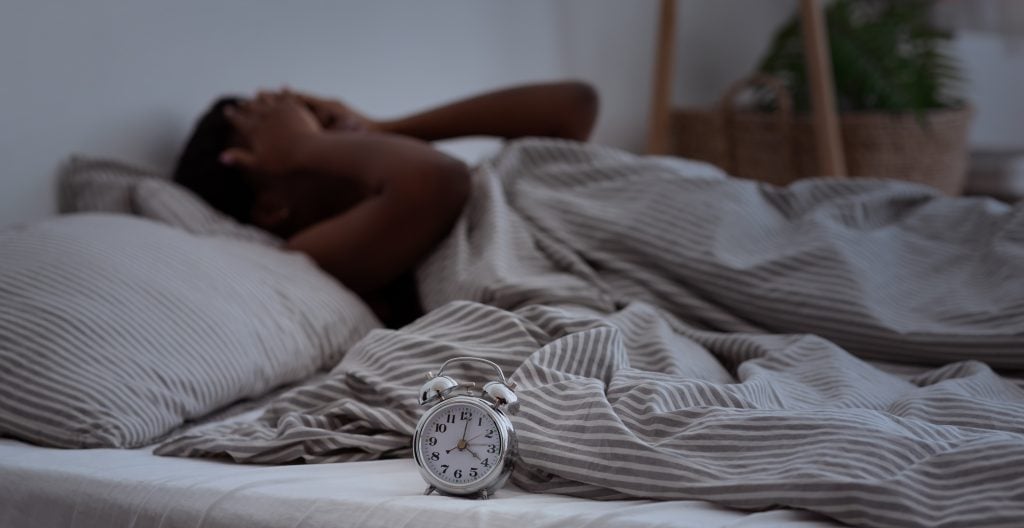It can often be a vicious cycle whereby your stress causes sleepless nights, and in turn, a lack of sleep causes stress. Our blog explores the relationship between stress and sleep in greater detail and offers valuable tips on maintaining a good night’s sleep even during adverse moments.

Apart from the obvious benefit of a good night’s sleep- the expectation of feeling more alert and productive the following day, adequate sleep quality and quantity are renowned for powerful stress reduction.
A regulated sleep routine calms and restores the body improves concentration, regulates mood, and sharpens judgment and decision-making. Insufficient sleep can influence our mood, character, and makeup. Research demonstrates that lack of sleep makes you more emotionally reactive, impulsive, and sensitive to negative stimuli.
If only it was as simple as ‘sleep more and you’ll stress less’. As we mentioned earlier, whilst sleep can reduce stress, the circumstances behind the stress are likely to keep you awake at night. In fact, a study revealed that 42 percent of adults report that their sleep quality is fair or poor and 43 percent report that stress has caused them to lie awake at night in the past month.
With this in mind, we recommend getting into the habit of being proactive and identifying ways to reduce your stress levels. Of course, stress varies from individual to individual, with everyone dealing with anxious moments in different ways and circumstances impacting how stressed you’re likely to feel. However, the simple and effective methods listed below could help you on your way to a better night’s sleep and, consequently, reduce stress levels.
Albeit easier said than done, acting in a proactive rather than reactive manner could change everything. Often, that feeling of loss of control causes us to stress and, therefore, where we can take control of the situation. For instance, instead of anticipating an uncomfortable conversation, address the issue yourself and explain your reasoning or thought process relating to the issue at hand. You’ll soon realise that one tricky conversation that reaches a resolution is much more favourable than days or even weeks of sleepless nights and worries.
It may not come as a big surprise to learn that an excessive volume of alcohol is likely to increase the likelihood of stress and, therefore, impact your night’s rest negatively. Drinkaware explains how alcohol has an effect on the brain that can lead to feelings of being less inhibited, depression, aggression, anger, anxiety – or stress. This isn’t to say you should completely cut out alcohol from your diet; instead, it should be consumed in moderation. For context, 2 drinks or less a day for men or 1 drink or less for women a day is advised.
Often, when you’re feeling stressed, it’s all too easy to find yourself in the ‘firing line’ and quickly become overwhelmed and anxious. Instead, be kind and prioritise yourself; try setting aside a couple of nights a week for some quality “me time” away from work. In such a fast-paced world, long and tiring hours are almost inevitable, but always find time for yourself.

So often, we’re swept up in trivial matters and we forget what’s actually important in life. Take a minute or two and reflect on everything you appreciate in your life. If it helps, try writing down 3 things that went well or for which you’re grateful at the end of every day.
Whether stressed or not, an unsuitable or poor-quality mattress won’t promote a restful night’s sleep. Even when you’re not feeling stressed, you’re likely to find yourself tossing and turning in search of some much-needed shut-eye. This isn’t to say that by upgrading your mattress, your stress will miraculously disappear. However, a comfortable and supportive mattress provides the foundations for a better night’s rest.
If your mattress shows signs of wear and tear or features a dip in the middle, it’ll struggle to distribute your weight evenly and provide sufficient spinal support. If so, now could be the perfect time to upgrade your sleeping solution. Here at Mattressman, we feature an extensive range of quality yet affordable mattresses. Regardless of your sleeping position or preferences, we’ll feature something for you. Moreover, we offer a 60-night sleep trial on all mattresses purchased alongside a mattress protector for additional peace of mind.
You may even be sleeping on a mattress in fantastic condition, but that doesn’t necessarily mean it’s suitable for you. With mattresses, it isn’t a case of one size fits all, and your sleeping position goes a long way to determining the right fit. As a general rule of thumb, soft or medium mattresses are recommended for side sleepers. Those who interchange positions throughout the night should consider a medium-firm mattress, whilst firm and extra-firm mattresses are designed with front and back sleepers in mind. More information regarding mattress suitability is covered in our ‘What mattress tension do I need?‘ blog.
Please note that Mattressman are not healthcare professionals. Our blog intends to highlight the link between stress and sleep. If you’re struggling with stress, please contact your GP.